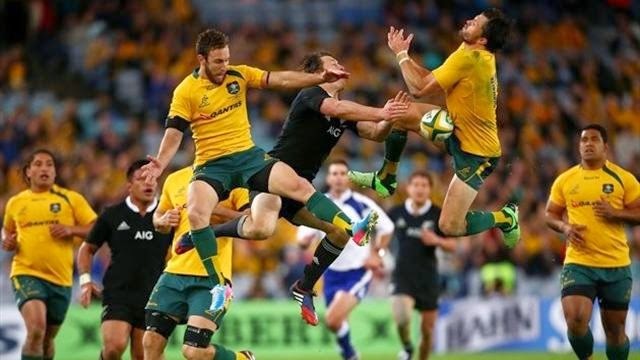Forget the scoreboard. Australia lost the opening Bledisloe Cup clash to New Zealand in Sydney on Saturday night.
The Wallabies may have denied the All Blacks what would have been a Tier 1 record 18th consecutive victory – for the second time – with a 12-12 draw but they should be celebrating a rare victory over their fierce rivals that would have further fuelled the feel-good factor in Australian rugby generated by the Waratahs’ recent Super Rugby triumph.
They may have ‘won’ the memorable 18-18 draw between the sides in Brisbane back in 2012 – when the All Blacks’ last 17-game winning run was brought to an end – but this time there can be no jubilation.
Ewen McKenzie’s side should have one hand on the sizeable silverware that has eluded them since 2002, be in pole position in the race for the Rugby Championship crown and packing their bags for their trip to Eden Park next weekend bruised but buoyant having secured their first success over their cross-Tasman neighbours since 2011.
On a rotten night at the ANZ Stadium where the elements did their best to ruin the game as a spectacle, Australia did not help themselves with crucial errors and debatable tactical calls, along with a resolute if slightly off-colour New Zealand defence, contributing to what will be widely seen as a huge missed opportunity.
Twice the visitors were reduced to 14 men with prop Wyatt Crockett sin-binned in the first half and replacement Beauden Barrett also yellow carded in the second half but the Wallabies could only add a penalty during each player’s absence.
But Australia did not need a numerical advantage to dominate proceedings and enjoyed the better of their rivals for much of the game. That apparent superiority clearly influenced some of the calls by Wallabies skipper Michael Hooper that have since come under the microscope.
The 22-year-old is a rising star of the game and already a key figure in the Wallabies’ set up having been handed the captaincy honour during the recent series against France. The flanker has since underlined his suitability for the role by steering the Tahs to the Super Rugby crown but that will not prevent questions being asked of his decision making in such crucial situations.
In a game where the elements demanded a tight game and limited creative expression, his call to turn down a relatively easy shot at the posts in the first half in the hope of riding his side’s momentum all the way over the All Blacks’ try line was going to be pivotal either way and so it proved.
Kurtley Beale’s missed kick robbed the home side of due reward for their efforts in terms of earning great field position and also deprived them off a huge psychological blow. The result was a six-point deficit as the sides headed to the tunnel and they would not get back on level terms until late in the game.
‘Our tails were up’, insisted Hooper post-game and McKenzie stood by his man insisting that the plan was always ‘to take a few risks’. Time will tell if they would take the same approach again and it must be remembered that only one or two sides have the ability and armoury to weigh up such decisions with the All Blacks standing in opposition.
Australia sensed this could be their day but their eagerness to take the game to New Zealand also cost them. Silly errors gifted hard-earned field position and possession away with poor judgement rather than the wet conditions to blame.
Israel Folau stepping into touch as he fielded a clearance, Nathan Charles advancing ahead of the kicker at a re-start, Beale crawling for a few extra yards having been tackled and Folau firing a wild pass above Beale inside the All Blacks’ 22 with the visitors’ defence stretched will all make for painful reviewing.
Despite the setbacks, the game was still there to be won by an Australia side that dominated the second half only to be denied by a deliciously defiant New Zealand defence with the dumping into touch of Australia’s Pat McCabe by Julian Savea and Ryan Crotty the highlight. Not content with snuffing out the attack within inches of his side’s line, Savea was quick to his feet to feed Aaron Smith with a quick lineout and the scrum-half duly found touch on half way in a simply brilliant passage of play worthy of as much credit as any try.
Far from their best, New Zealand were shackled for long periods but their excellent kicking game, and inexhaustible kick chase, gave them relief when they needed it and the policy of chipping in behind the Australia defence rather than go long and offer dangerman Folau the chance to wreak havoc was very successful.
New Zealand were also not immune to errors with even the experienced heads of Richie McCaw and Keven Mealamu among those to falter as the rain and pressure intensified. But as is their way, the All Blacks were still in the contest as the game reached full time and just as he did when the two sides met in Brisbane in 2012, when the Wallabies ‘won’ an 18-all draw between the two sides, McCaw opted for one more roll of the dice in the hope of preserving his side’s winning run that once again came to nothing.
It is a shame that the opening round of the Rugby Championship was hampered so badly by the weather with precipitation rather than precision also the order of the day in Pretoria where South Africa got the better of Argentina.
But there is better weather on the way in Auckland next week and unfortunately for a Wallabies side looking for their first win at Eden Park since 1986, it will be accompanied by a vastly improved All Blacks performance.


